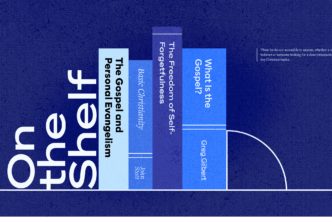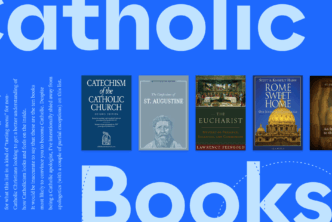Editor’s note: The resources recommended in our On the Shelf series are the opinions of the featured individuals, not those of Logos. We are publishing a breadth of voices to reflect varying perspectives within the church.
Sean McGever (PhD, Aberdeen) is area director for Young Life in Phoenix, Arizona, and an adjunct faculty at Grand Canyon University. He is the author of Evangelism: For the Care of Souls, The Good News of Our Limits, and Born Again: The Evangelical Theology of Conversion in John Wesley and George Whitefield. He has spent many years studying, practicing, and teaching evangelism. This list is the fruit of those decades of experience.
Please note: The books and explanations below are from the resources section of Sean’s Lexham book, Evangelism: For the Care of Souls. And now, Sean’s top ten picks:
1. Evangelism and the Sovereignty of God, by J. I. Packer
The title of this classic book accurately reflects its contents. This book is not a blueprint for evangelistic tactics. Instead, Packer’s book discusses the sovereignty of God from a Reformed perspective and how that relates to the responsibility of Christians to evangelize. Packer does his best to untangle a seeming contradiction between God’s sovereignty and human responsibility in evangelism. In the end, he concludes that a comprehensible solution is not available to humans. As he explains this, he provides practical wisdom and principles for evangelists. Reformed Christians frequently list this as one of their favorite books on evangelism, but it also has much to say to evangelists in all traditions.
2. Evangelism in the Early Church, by Michael Green
This academic book provides an in-depth analysis of evangelism in the early church. Green provides numerous primary source details and offers thoughtful analysis on how the early church shared the gospel and initiated new believers into Christianity. This book will be a difficult read for many modern evangelicals because Green shows that the early church grew astronomically through methods very different from modern approaches. Generally speaking, early church evangelism occurred through non-Christians becoming interested in the countercultural lifestyles of early Christians; then, when the non-Christian asked about the Christian’s faith, a slow process of initiation began that culminated in baptism prior to becoming a member of the church.
3. Transforming Conversion: Rethinking the Language and Contours of Christian Initiation, by Gordon T. Smith
Smith’s book is one of the best comprehensive treatments of the topic of conversion, written in a careful but accessible way. He shows how conversion has been understood in the history of the church, and this information lays the groundwork for us to understand that much of modern evangelism is derivative of revivalism. Smith builds on his historical work to show how we can deepen modern Christian initiation by learning from the past.
4. The King Jesus Gospel: The Original Good News Revisited, by Scot M. McKnight
This book takes dead aim at evangelistic approaches that present the gospel as simply “how to get to heaven” or “how to get saved.” McKnight rightly shows how the modern conception of much of evangelism is off course and reductionistic. Though he reaches further than is prudent in his attempt to explain the Nicene Creed as an exegesis of 1 Corinthians 15, his general point is taken and helpful. This book is a readable antidote for evangelists who are concerned about the modern reduction of the gospel.

5. The Logic of Evangelism, by William J. Abraham
Abraham has his finger on the heartbeat of many of the strengths and weaknesses of modern evangelism. Some readers might struggle with this book since his approach is more academic than most books on this list. While he is critical of some of the practices and principles of evangelism, he responds with careful, abundant, and constructive insight. He joins a chorus of modern authors who believe that modern evangelism needs to reorient its proclamation of the gospel toward the kingdom of God that is already present but not yet fully here.
6. The Master Plan of Evangelism, by Robert E. Coleman
This is a classic book on evangelism, but not in the way you might expect from its title. This book explores strategies and tactics for leadership and discipleship in order to accomplish a sustainable and growing evangelistic ministry. Coleman spends little time explaining the gospel or ways to present the gospel to people. I should add that the book is a bit dated and embedded with a strong “wartime” mentality that pervaded American Christianity when Coleman wrote the book. This book is most helpful for churches and training organizations seeking to develop leadership amid evangelistic activities.

7. Mere Christianity, by C. S. Lewis
When Christianity Today declared Mere Christianity the “book of the century,” they provided a simple explanation: this book is “the best case for the essentials of orthodox Christianity in print.”1 This book presents a strong case for Christianity as it discusses human nature, common conceptions of God, Christian behavior, and an introduction to the Trinity. Aside from the content, evangelists can mine this book as an exemplar of presenting Christianity in an engaging way people will hear. It is both an example of excellent evangelism and an excellent training tool in evangelism.
8. Models of Evangelism, by Priscilla Pope-Levison
This very practical book discusses eight approaches to evangelism, such as personal evangelism, small group evangelism, and visitation evangelism. Each chapter covers a different model and includes its biblical basis, theological themes, historical development, step-by-step ways to implement, and an appraisal of each model. While some of the models will be more useful to readers than others (for instance, her chapter on evangelism through media may not be as useful to some people), her systematic analysis of each approach highlights features of evangelism which ministers might overlook otherwise.
9. On the Incarnation, by Athanasius of Alexandria
On the Incarnation is one of the most important works of Christology of all time, and written by one of the church’s most significant theologians. At first, it might not appear to be relevant for modern evangelism since Athanasius wrote it in the fourth century, but it is very useful today. Athanasius’s purpose for writing this book was to explain the purpose of the cross—which is a topic at the heart of evangelism. Athanasius begins his book with a discussion of creation and then moves on to sin, the cross, the resurrection, and an explanation of how people are changed by this message. Modern evangelists would be wise to fortify their understanding of the gospel through a deeper understanding of Christ’s work and divinity with this classic text written seventeen hundred years ago.
10. The Reason for God: Belief in an Age of Skepticism, by Timothy Keller
Keller’s book is one of the best modern popular-level apologetics books available. Keller forged his approach out of many years of pastoral ministry in a secular context. Keller explores seven of the most common objections and doubts about Christianity before presenting seven reasons to believe. It is not a book about evangelism but a book that does evangelism. In this way, it is similar to Lewis’s Mere Christianity.
Don’t miss these other book recommendations
- Hot Takes on Top Commentary Sets in Logos
- 10 Anglican Books You Should Know
- 42 Best-Selling Books by & for Pentecostals
- 40 Best-Selling Books for Baptists
- “Books of the Century,” Christianity Today, April 24, 2000. https://www.christianitytoday.com/ct/2000/april24/5.92.html.




